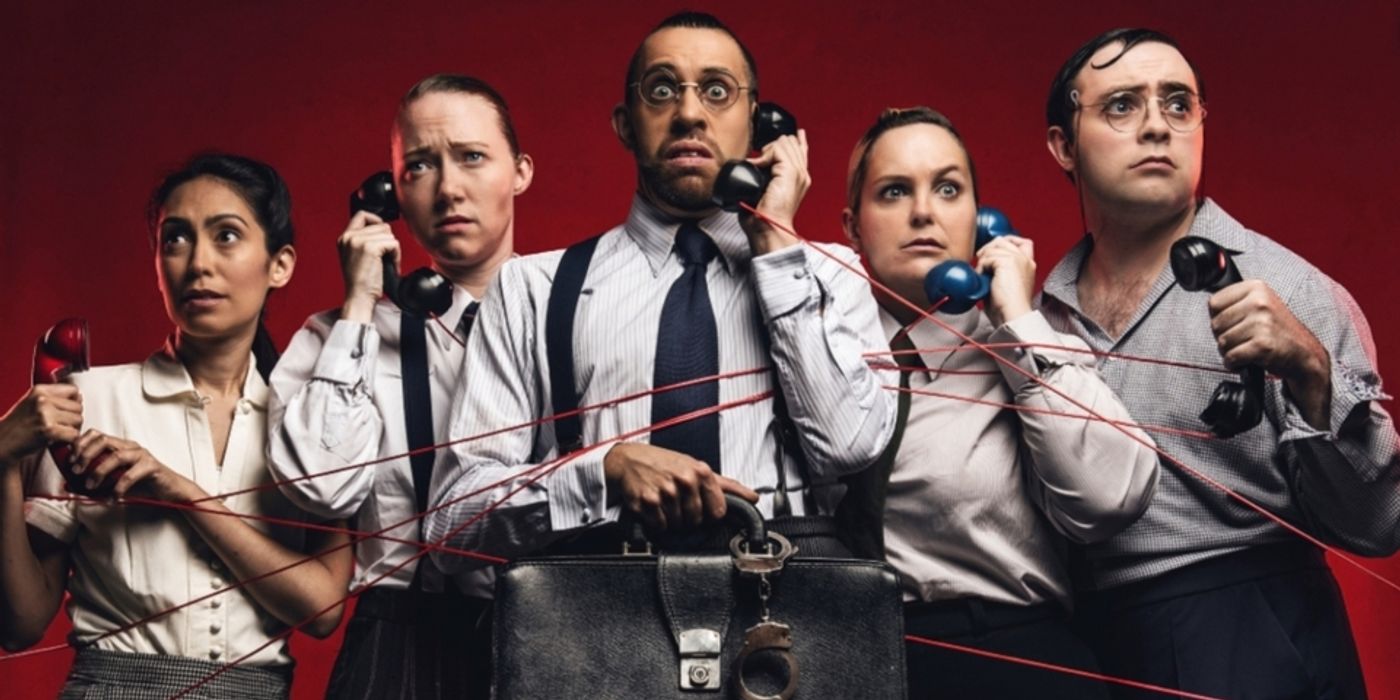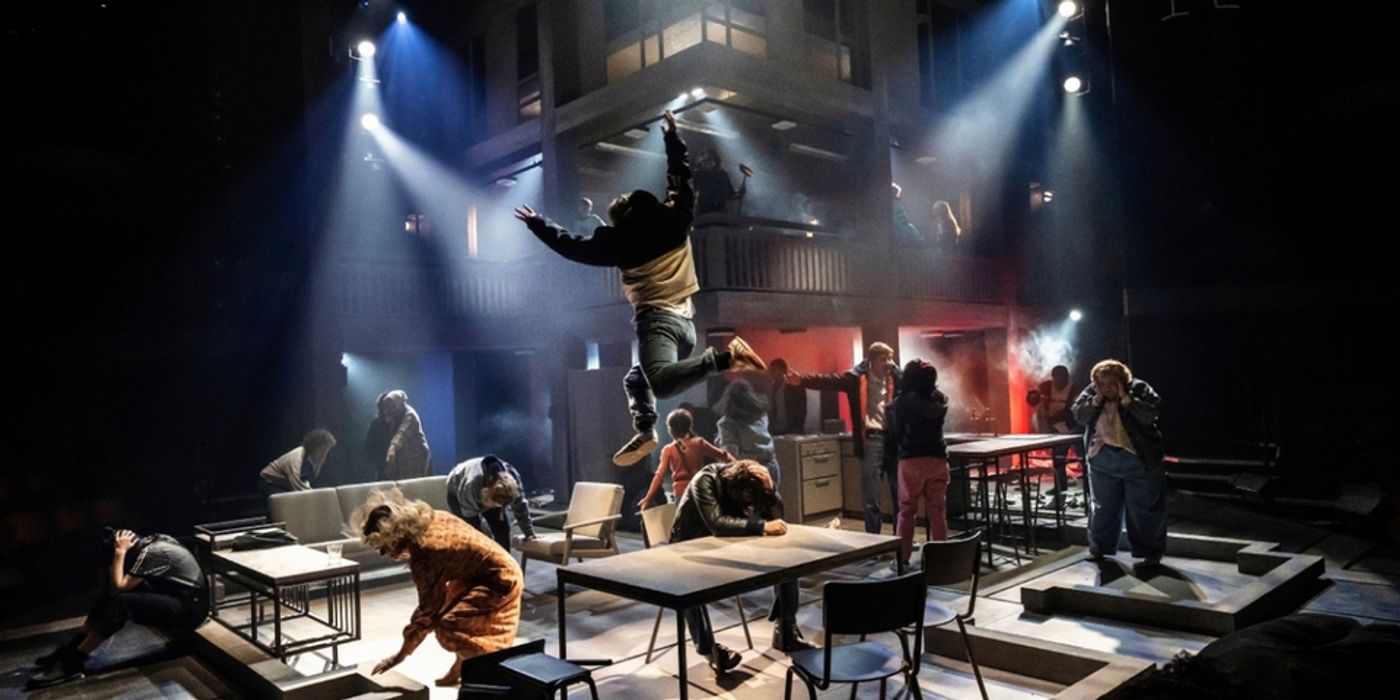Interview: 'A Show This Funny Has No Business Being As Moving As It Is!' Robert Hastie on Musicals, James Bond and Directing OPERATION MINCEMEAT
Operation Mincemeat is running at the Fortune Theatre

Operation Mincemeat, the little show that could, has taken the West End by storm, selling out performances and already selling CDs and vinyl of their upcoming cast recording.
BroadwayWorld UK recently spoke with the show's director, Robert Hastie, about what it's been like to be involved with Operation Mincemeat, how he became a director, and what it's like to direct both Shakespeare and musicals!
How did you first become involved in the theatre world?
I grew up in Scarborough, in the northeast coast. And I was interested in theatre and drama for as long as I can remember. So Scarborough has a theatre called the Stephen Joseph Theatre, which was, for many years, run by Alan Ayckbourn, it's where he premiered one of his many, many, many great plays. I think that was what got me got me really interested in theatre. I was also very lucky to have teachers encouraging and enthusiastic about theatre. We did lots of drama at school, and they also took us on lots of school trips.
What made you want to get into directing specifically?
So I trained as an actor and I worked as an actor for 10 years...about. But something was always niggling. I wanted to be an actor, because if you're interested in, if you're excited by the theatre, that's what you see. That's the bit you see. So my ambition latched on to that. I really enjoyed acting and I have enormous admiration for actors, but all the way along, I'd had a sneaking suspicion that there might be another job in this art form that I was better at, or that fitted me better. And as I was acting, I was talking to more and more people, to other directors in particular. And eventually, I was in a dressing room with one actor on what turned out to be my last professional job. And he said, "You've been talking about this for a long time, haven't you? Why don't you just do it?" And shortly after, two things happened.
I had an assistant job on a West End production of Much Ado About Nothing directed by a director I'd worked with before, who very, very graciously took me on a crash course in all the bits of a director that you don't get to see as an actor. And I also got into conversation with the artistic director of the Finborough Theatre, brilliant man named Neil McPherson, who said, would I be interested in going and directing something there? And he gave me a stack of plays, and I went away and read them. I just became completely obsessed with this play by a writer called John McGrath, whose plays are not nearly as well-known as they should be. And I ended up directing one of those (Events While Guarding The Bofors Gun in 2012) for the Finborough. As soon as I'd done that, I thought, "Yeah, this is definitely what I should be doing."
What is it like directing Shakespeare's works versus musicals?
Actually, they've got more in common than different, I think, in that they're big, generous-hearted. They ask quite a lot of an audience because you have to completely enter the world of both of them. And they're also really good at going from the very, very small and focused so we're just watching one person delivering a speech or singing solo, to great, big, "bells and whistles" company numbers, and that intimate and epic in the same piece is something that happens in both classic Shakespeare and also in musicals. And I've been really lucky over the last seven years to work in a theatre in Sheffield, The Crucible theatre, which is brilliantly good at both those things.
What made you want to get involved with Operation Mincemeat?
It was one of the best phone calls in my life when SpitLip asked me to come on board as director. I really admired their work. I spoke to Kill the Beast, the group that SpitLip came out of. I'd been taken to Operation Mincemeat by a friend and thought, "This is really next-level stuff." It's seemingly very silly and doesn't take itself too seriously, but watching it, I was thinking, "There is here the potential for what we're all looking for, which is a big step forward in musical theatre and a great night out."
 What has it been like taking such a small show and bringing it to the West End?
What has it been like taking such a small show and bringing it to the West End?
The challenge has been how to retain the thing that makes it really special, which is . . . well, let's get the word right because it's not smallness. There's nothing small about it, but it is intimate. It's a small gang telling a big story. You could absolutely do the version of this with a cast of thousands. The story would sustain an enormous production, and there have been very lavish movie versions of this true story. But, what's special about this is the incredible inventiveness and ferocious pace of the storytelling that a small company can do. They're never in one character for longer than five minutes before they're somebody else. Although you do have characters that run all the way through, it's a great big panorama. So the challenge has been how to scale up the show so that it's delivering a West End experience, but retaining the heart of it, which is this plucky gang of underdogs taking on this massive challenge.
Had you known about the story before seeing the show?
Yeah. I was obsessed with James Bond when I was little, and still am! And I had a book that was about real-life secret agents and spy adventures. And there was a chapter on Bill Martin, "The Man Who Never War". So actually, when I started researching for this show, a lot of that came flooding back. And it is one of those stories that is too good to be true if you're looking for dramatic material. You go, "Really? They actually did that? That actually happened! There really was another plane that crash landed in the same spot with an American pilot with the same name?" Those sorts of details and twists and turns of the story. It's one of those stories you go, "This is a story everybody should know." And it wasn't just a quirky episode. It was one of the significant turning points of the Second World War. Because this bonkers gang of misfits in a bunker in London came up with this completely outlandish plot, borrowed from fiction.
How do you see your role as director?
So this has been quite an unusual directing job because I was brought in to work with a company that had already been telling this story in various versions for several years. And so actually, the job of the director here was very clear - to come in, help them take the script that they've been developing for many years, and put it on stage. Normally, a director works with the actors to craft their performances, to stage the show, to put it on stage, and orchestrate the movement - what we call the blocking, when the actors stand where they do. Exactly. So that's working with the actors. And we'll do that work in a musical in collaboration with a choreographer and the musical director. But then also work with the designers and the creative team, the set and costume designer, the lighting designer, the sound designer, to build the production that the actors are going to inhabit - to design what the show is going to look like, what it's gonna sound like, how it's going to feel to an audience.
You're really there to curate the audience's experience. And back before they invented the job of director, there must always have been someone, maybe that was an actor within the company, or someone doing a stage management role, or the writer, who volunteered to sit outside of what the actors were making up in a rehearsal space, and go on stage and say, "Yeah, that's good, but it would be clearer if you stood over there." Or, "That works, but if you're a bit louder in that . . ." You're there to hold the audience's experience until the audience turns up. Normally, the director would cast the actors. That was the one bit of the job that was different because they were already there when I arrived! So actually, the job has been really excitingly very different to what I would normally do in that you're working with a group of people who already know each other.
What was it like directing Operation Mincemeat while also working on Standing at the Sky's Edge?
Well, two very, very, very different pieces.
[Laughs]
And I guess that's what's exciting about musical theatre, isn't it? Two shows that are so different in style and tone and content and message are still, broadly speaking, musicals.
Standing at the Sky's Edge has also been a long journey. We started it in Sheffield - it first went on in 2019, which I think was around about the same Operation Mincemeat started its on-stage journey, though both had been developed pieces of writing for a long time before.

Photo Credit: Johan Persson
I sometimes think that we go to the theatre to walk in the shoes of people who we'll never meet, to experience situations in places we'll never go to or be in, and to get a glimpse of what it is to live another person's life. Sometimes we're going to be transported and transformed, and sometimes we go to see ourselves celebrated, we go to see our own stories being told. And for me, working in Sheffield and telling the story of Standing at the Sky's Edge was very much about reflecting our audience's lives back at themselves. So that's a very good example of one, and Operation Mincemeat is one of those that transports you to a different time and place and gives you a glimpse of a world of secret agents and spies that most people will never get to live themselves.
What is it about Operation Mincemeat that you think has made it so popular, especially with younger audiences?
I think there is simultaneously a really irreverent, sometimes very biting, comedy to it, and also a real heart. A show this funny has no business being as moving as it is! It absolutely delivers the laughs. It's one of the things that I think Kill the Beast and SpitLip are very, very good at - a very high gag rate. The laughs are thick and fast. Given that, this piece is so funny and is treated with such irreverence. And the story is told in a very unconventional way.
I think its great strength is that it also really makes you feel. It resonates with audiences of any age but particularly younger audiences because of the way it tells the story very clearly. But the way it tells it has no patience for conventions of casting, whether that's age or gender, or ethnicity. Anyone can and does play anyone at any point. And for a story that is largely about older white men because of the time and the milieu that the story is set . . . there are two very important female characters, but overwhelmingly, the story is told from the perspective of men of a particular class and character. And in that sense, that's the purest form of theatre. We're going to get you to pretend with us and you're going to enjoy that and you're going to understand the story. And we don't need to have exact replicas of the way the characters looked and spoke and behaved. What we can do is create our own versions of those characters that are sometimes silly, sometimes enormously respectful, and will have emotional investment, but that don't have to behave by the same rules of casting that you'd expect if you were coming to this story in a different context.
What do you hope audiences take away from Operation Mincemeat?
Have a brilliant time! Because we all need it - we all need a good night out. I expect they come away as I did, marvelling at the ingenuity and energy of the performers. I hope the audience has come away with a smile on their face and songs in their heads that will stay there for days.
Do you have any advice for those looking to go into directing?
Watch as much theatre as you can, and don't just watch the theatre - watch the audience. Because when we start out, we want to make the work we want to make and we want to own it. And in that sense, we're making it for ourselves. But if we forget that you're just making it for yourself, then that's a hobby, that's not a job, and it's certainly not an art. So know who it is that you're making the work for, know who it is who's going to come and see it. And that doesn't mean you have to pander to the audience and give them just what they want.
It might be that they don't know they want your vision yet, but you're going to show them and that's going to completely transform their understanding of what theatre can be. But never lose sight that this whole thing only works if people turn up to see it. And that's the half that we don't pay enough attention to when we're starting out, so go watch as much theatre as you can. It's why I love theatres like the Stephen Joseph Theatre in Scarborough, which is in the round, and like The Crucible in Sheffield, which is a three-sided thrust space because you're always watching the audience as well as the show. And that is just as instructive as watching the actor or watching the lighting or watching the way the set moves.
And finally, how would you describe Operation Mincemeat in one word?
Unstoppable!
Operation Mincemeat is running at the Fortune Theatre from 29 March.
Videos

